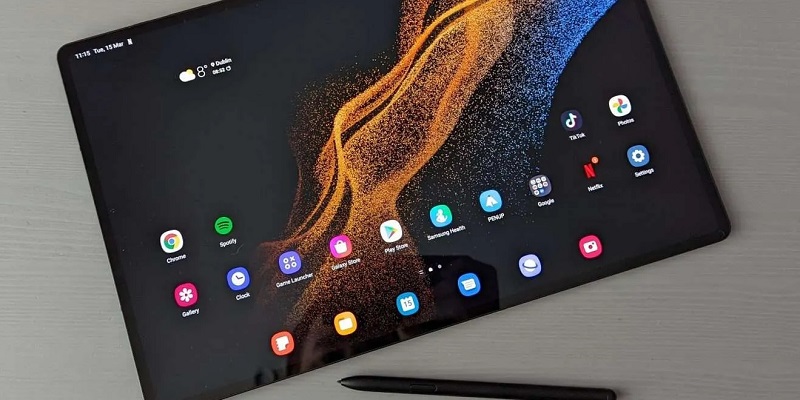Samsung’s upcoming Galaxy Tab S9 series has been the subject of numerous leaks and rumors in recent months. While the company has not yet confirmed any official details about the tablets, new leaks suggest that the devices are expected to be released alongside the Galaxy Z Fold 5, Z Flip 5, and Watch 6 in late July. The headline device, the Samsung Galaxy Tab S9 Ultra, has been the subject of recent leaks, revealing key design features, display, battery, and specifications. Here is everything we know so far.
New Renders: OnLeaks and MySmartPrice Provide a Sneak Peek
OnLeaks and MySmartPrice have recently released new renders of the Samsung Galaxy Tab S9 Ultra, providing us with a first look at the design of the upcoming device. The renders demonstrate that the basic design of the Tab S9 Ultra remains similar to its predecessor, the Galaxy Tab S7, featuring an ultra-thin bezel on the front and a metal back cover, providing it with a sleek and premium appearance.
Design: No major changes up front
As mentioned, the front view of the Samsung Galaxy Tab S9 Ultra reportedly isn’t much different from its predecessor. The device’s super-thin bezel leaves no room for a physical home button, and instead, it is embedded in the screen. The Tab S9 Ultra features a V-shaped notch on the front that houses the dual front-facing cameras.
Display: 14.6-inch AMOLED with dual front cameras
The Samsung Galaxy Tab S9 Ultra will feature a stunning 14.6-inch AMOLED display with a resolution of 2960 x 1848 px. The display will be protected by Corning’s Gorilla Glass Victus. The device’s V-shaped notch will house dual front-facing cameras, allowing users to take high-quality selfies and make video calls.
Back Design: Reoriented Cameras and Wireless S Pen Charging
The back of the Samsung Galaxy Tab S9 Ultra has a slightly altered design compared to its predecessor. The back cover now has two cameras isolated in their own metal rings, positioned above the wireless charging pad for the S Pen. The new design is more convenient for users as it allows them to charge their S Pen wirelessly without having to worry about misplacing it.
Battery: Robust 11,200 mAh battery with fast charging
The Samsung Galaxy Tab S9 Ultra will feature an 11,200mAh battery with 45W fast charging capability. The battery on this device is expected to be more long-lasting than its predecessor.
Rumored features include an IP68 rating, Android 13, and One UI 5.1
According to rumors, the Samsung Galaxy Tab S9 Ultra will have an IP68 rating that will make it dust and water-resistant. It will also run Android 13 out of the box with One UI 5.1 on top. This new version of One UI is expected to bring exciting features such as an updated dark mode, improved notifications, and a revamped multitasking UI.
Chipset: Snapdragon 8 Gen 2
The entire Samsung Galaxy Tab S9 series is expected to feature the Snapdragon 8 Gen 2 chipset for Galaxy, which is expected to offer powerful processing speed, excellent graphics capabilities, and support for 5G connectivity.
RAM and Storage: 8/12/16GB of RAM and 128/256/512GB of storage
The Samsung Galaxy Tab S9 Ultra will come in three different variants, each with different RAM and storage configurations. The lineup will have 8/12/16GB of RAM and 128/256/512GB of storage options. The baseline 8/128GB model is expected to carry UFS 3.1 storage, while the other variants will have the speedier UFS 4.0 type.
The Samsung Galaxy Tab S9 Ultra is shaping up to be one of the most impressive tablets on the market. From its powerful processor to its robust battery, stunning display, and impressive camera system, this device is sure to be a hit with tech enthusiasts. While we wait for Samsung to officially confirm the release date and price of the Tab S9 Ultra, these leaks provide a sneak peek into what we can expect from this exciting new tablet. Stay tuned for further updates.

